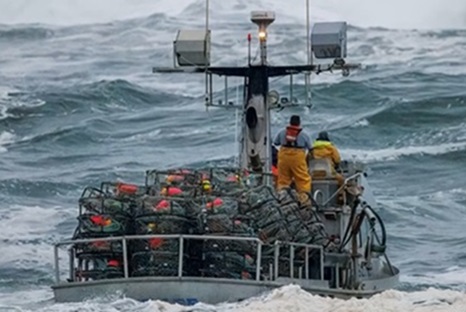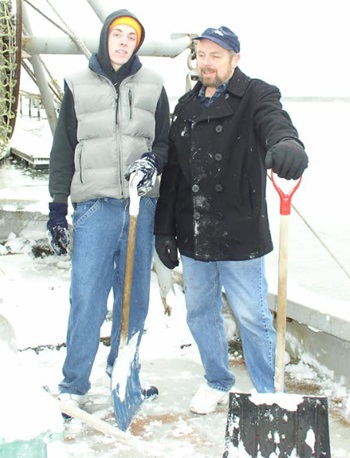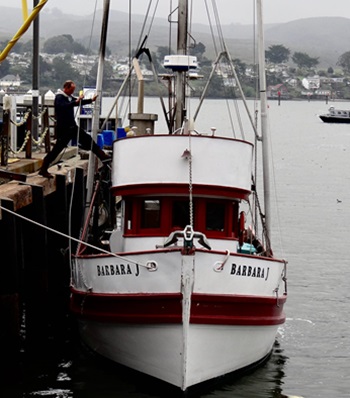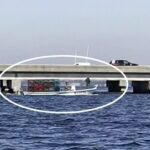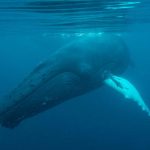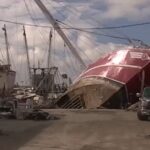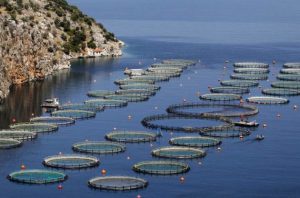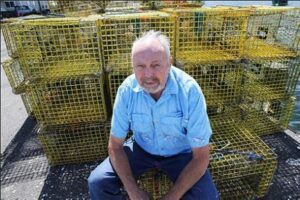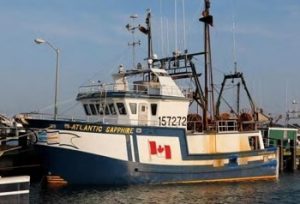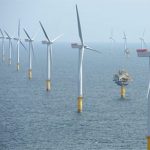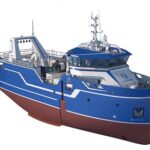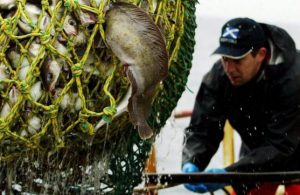Tag Archives: commercial fishermen
Commercial fishermen express frustration with late open to Dungeness crab season
 Last week, commercial Dungeness crab fishery began in Humboldt County. On Wednesday, Jan.15, after a 10-day delay, the season opened throughout the California Department of Fish and Wildlife’s (CDFW) Northern Management Area, a region spanning from the coast of Sonoma County to the Oregon border. Many commercial fishermen in Humboldt County expressed frustration with the wait — and with these types of delays becoming a perennial problem. They say frequent delays to the opening of a crabbing season that once relied on December holiday sales have left fishermen feeling squeezed. “The biggest downhill path for our fishery began five years ago when the state of California, in their lack of defense of the most lucrative fishery on the California coast, settled a lawsuit with the Center for Biological Diversity,” Rotwein said. “We’re on a trajectory to … being regulated out of business. Economically, I don’t know if the fleet can survive … Every single year since then has been something — a season delay, season closure.” more, >>CLICK TO READ<< 09:15
Last week, commercial Dungeness crab fishery began in Humboldt County. On Wednesday, Jan.15, after a 10-day delay, the season opened throughout the California Department of Fish and Wildlife’s (CDFW) Northern Management Area, a region spanning from the coast of Sonoma County to the Oregon border. Many commercial fishermen in Humboldt County expressed frustration with the wait — and with these types of delays becoming a perennial problem. They say frequent delays to the opening of a crabbing season that once relied on December holiday sales have left fishermen feeling squeezed. “The biggest downhill path for our fishery began five years ago when the state of California, in their lack of defense of the most lucrative fishery on the California coast, settled a lawsuit with the Center for Biological Diversity,” Rotwein said. “We’re on a trajectory to … being regulated out of business. Economically, I don’t know if the fleet can survive … Every single year since then has been something — a season delay, season closure.” more, >>CLICK TO READ<< 09:15
Jan. temps put summer shrimp haul at risk. What’s behind SC’s decision to help?
 Jeff Brunson, the state Department of Natural Resources’ crustacean fisheries manager, said the general trawl zone will close at 7 p.m. Wednesday, except for certain provisional areas located at the outer edge of inshore state waters, which will close Jan. 31. Shrimpers can still fish in deeper federal waters. The reason for the closure of the inshore state waters is cold water brought on by continued below-average temperatures. “As water drops, they migrate out farther to areas where it’s a little warmer,” Brunson said. “We’re trying to protect those overwintering shrimp and their migration this time of year is largely driven by water temperature.” Protecting these young shrimps is critical because they develop into adult white roe shrimp up to 8 inches long. And it’s those adult shrimps that make up the valuable spring and summer harvest. The value of the state’s entire shrimp harvest averaged $8 million between 2019 and 2023. “It’s our highest value fishery,” Brunson said. more, >>CLICK TO READ<< 07:57
Jeff Brunson, the state Department of Natural Resources’ crustacean fisheries manager, said the general trawl zone will close at 7 p.m. Wednesday, except for certain provisional areas located at the outer edge of inshore state waters, which will close Jan. 31. Shrimpers can still fish in deeper federal waters. The reason for the closure of the inshore state waters is cold water brought on by continued below-average temperatures. “As water drops, they migrate out farther to areas where it’s a little warmer,” Brunson said. “We’re trying to protect those overwintering shrimp and their migration this time of year is largely driven by water temperature.” Protecting these young shrimps is critical because they develop into adult white roe shrimp up to 8 inches long. And it’s those adult shrimps that make up the valuable spring and summer harvest. The value of the state’s entire shrimp harvest averaged $8 million between 2019 and 2023. “It’s our highest value fishery,” Brunson said. more, >>CLICK TO READ<< 07:57
Coastal Federation’s lost fishing gear recovery underway
 The 20 commercial fishermen and women hired for this year’s Lost Fishing Gear Recovery Project headed out Wednesday to begin collecting crab pots from the northeastern and central coasts. In its 11th year, the North Carolina Coastal Federation coordinates the project, which aims to locate and remove displaced fishing gear that can pose a threat to boaters, wildlife and the fishing community. The 2025 project is focusing on Marine Patrol Districts 1 and 2, the waters between the Virginia-North Carolina border and the N.C. Highway 58 bridge to Emerald Isle. The project takes place each year during the annual closure Jan. 1-31 that prohibits using crab, eel, fish and shrimp pots. more, >>CLICK TO READ<< 06:55
The 20 commercial fishermen and women hired for this year’s Lost Fishing Gear Recovery Project headed out Wednesday to begin collecting crab pots from the northeastern and central coasts. In its 11th year, the North Carolina Coastal Federation coordinates the project, which aims to locate and remove displaced fishing gear that can pose a threat to boaters, wildlife and the fishing community. The 2025 project is focusing on Marine Patrol Districts 1 and 2, the waters between the Virginia-North Carolina border and the N.C. Highway 58 bridge to Emerald Isle. The project takes place each year during the annual closure Jan. 1-31 that prohibits using crab, eel, fish and shrimp pots. more, >>CLICK TO READ<< 06:55
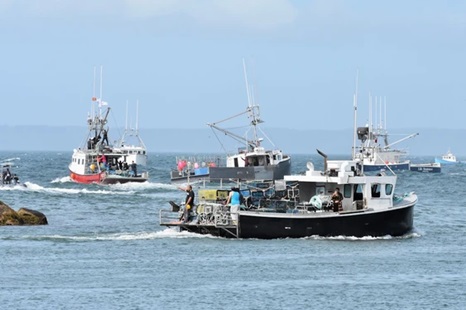
COMMENTARY: Bringing peace to Atlantic lobster fisheries, By Geoffrey V. Hurly
The ongoing controversy between Indigenous and non-Indigenous fishing interests is centred over equity in fishing rights. Indigenous groups claim that their treaty rights (signed in the 18th century) allow them to fish lobster (or any other species for that matter) anytime of the year, including outside the regulated fishing seasons imposed by Fisheries and Oceans Canada (DFO). Non-Indigenous harvesters argue that Indigenous people should not have the right to catch and sell lobsters at a time of year when commercial fishermen don’t. They worry about their own livelihood if lobsters are fished out of season during their moulting breeding time. more, >>CLICK TO READ<< 13:39
Fishermen may not like offshore wind, but some work for it
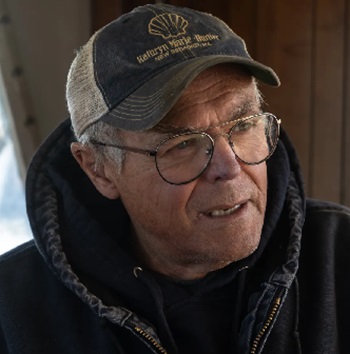 The blue-hulled scalloper, built in 1997, started out as a tender boat, transporting loads of fish between vessels and processing facilities. After a few years catching tuna, the vessel brought in over a million pounds of scallops over its life. But times, regulations and fish stocks have changed. The bivalves are still relatively lucrative, but vessels have spent more and more days sitting at the docks while expenses have risen. So two years ago, Alvernaz, the part-owner of six scallopers, put aside his personal feelings and did something he never thought he’d do: He signed up to work for an offshore wind company. In about two years, Vineyard Wind has paid about $8 million to local fishermen and vessel owners — many from New Bedford, like Alvernaz — to provide safety and security work during the wind farm’s construction (a figure that includes fuel costs). Photos, more, >>CLICK TO READ<< 06:16
The blue-hulled scalloper, built in 1997, started out as a tender boat, transporting loads of fish between vessels and processing facilities. After a few years catching tuna, the vessel brought in over a million pounds of scallops over its life. But times, regulations and fish stocks have changed. The bivalves are still relatively lucrative, but vessels have spent more and more days sitting at the docks while expenses have risen. So two years ago, Alvernaz, the part-owner of six scallopers, put aside his personal feelings and did something he never thought he’d do: He signed up to work for an offshore wind company. In about two years, Vineyard Wind has paid about $8 million to local fishermen and vessel owners — many from New Bedford, like Alvernaz — to provide safety and security work during the wind farm’s construction (a figure that includes fuel costs). Photos, more, >>CLICK TO READ<< 06:16
Doc film exploring Lake Erie fishing nets Leamington audiences
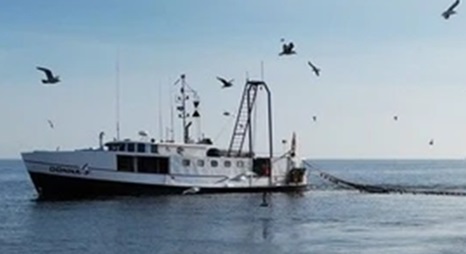 A new documentary being screened in Leamington offers a rare in-depth glimpse into Lake Erie’s important and historic commercial fishing industry. In his debut documentary, Netting the Waters, Simcoe-based filmmaker Daryl Granger dives deep into the industry surrounding the commercial catch of pickerel, perch, and smelt from the shallowest of the Great Lakes. “I wanted to show what it was really like on Lake Erie, because there’s a lot of interest in what happens out there,” Over the course of filming, Granger mainly followed two captains and their vessels. Captain George Gibbons, who leads the Eau Clipper and George A, specializes in gillnetting for pickerel and perch. Captain Joe Zimba, who commands the Donna F, trawls for smelt, a small freshwater fish commonly found in the Great Lakes. Photos, more, >>CLICK TO READ<< 14:56
A new documentary being screened in Leamington offers a rare in-depth glimpse into Lake Erie’s important and historic commercial fishing industry. In his debut documentary, Netting the Waters, Simcoe-based filmmaker Daryl Granger dives deep into the industry surrounding the commercial catch of pickerel, perch, and smelt from the shallowest of the Great Lakes. “I wanted to show what it was really like on Lake Erie, because there’s a lot of interest in what happens out there,” Over the course of filming, Granger mainly followed two captains and their vessels. Captain George Gibbons, who leads the Eau Clipper and George A, specializes in gillnetting for pickerel and perch. Captain Joe Zimba, who commands the Donna F, trawls for smelt, a small freshwater fish commonly found in the Great Lakes. Photos, more, >>CLICK TO READ<< 14:56
Is it 50 per cent of the fishery? What’s fair and what the feds won’t discuss on First Nations rights
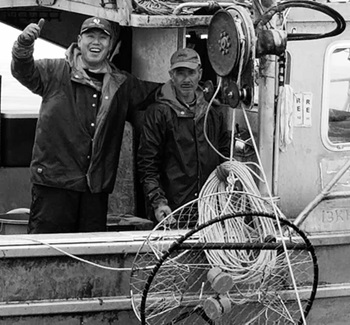 What’s fair? What’s a fair amount of Canada’s fisheries to transfer to First Nations to satisfy their moderate livelihood right? What’s fair to individual rights holders but, also, what’s fair to non-aboriginal communities whose cultures and incomes have relied upon fisheries for generations? Is it 50 per cent? That’s what Fisheries and Oceans Canada has gone with in two recent transfers of access to First Nations in Atlantic Canada and British Columbia that occurred without compensation to the commercial licence holders on the losing end. In 2021, Jason and the 33 other commercial fishermen in crab fishing area 24 were informed by DFO that the federal government was taking half the area’s 1,600 traps and giving them to the Five Nations. “It was definitely not fair,” said Voong, president of the BC Crab Fishermen’s Association, in a phone interview. more, >>CLICK TO READ<< 11:07
What’s fair? What’s a fair amount of Canada’s fisheries to transfer to First Nations to satisfy their moderate livelihood right? What’s fair to individual rights holders but, also, what’s fair to non-aboriginal communities whose cultures and incomes have relied upon fisheries for generations? Is it 50 per cent? That’s what Fisheries and Oceans Canada has gone with in two recent transfers of access to First Nations in Atlantic Canada and British Columbia that occurred without compensation to the commercial licence holders on the losing end. In 2021, Jason and the 33 other commercial fishermen in crab fishing area 24 were informed by DFO that the federal government was taking half the area’s 1,600 traps and giving them to the Five Nations. “It was definitely not fair,” said Voong, president of the BC Crab Fishermen’s Association, in a phone interview. more, >>CLICK TO READ<< 11:07
Framework 39 to determine access, fishing specifications for New Bedford scallopers in 2025/2026
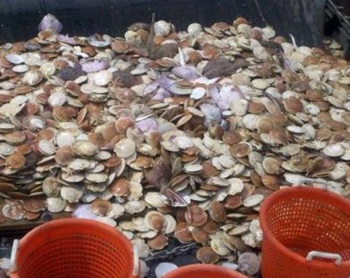 Scallop Framework 39 proposes 2025 fishing year specifications, 2026 default specifications, revisions to seasonal bycatch closures to improve scallop yield, and measures to allow Northern Gulf of Maine (NGOM) permit holders fishing on directed scallop trips in the NGOM Management Area to possess scallops south of 42° 20′. “The New England Fishery Management Council took final action on Framework Adjustment 39 to the Atlantic Sea Scallop Fishery Management Plan when it met December 3-5, 2024 in Newport, Rhode Island. The framework contains specifications and measures to guide the 2025 scallop fishing year, which begins on April 1. The action also includes default measures for fishing year 2026. The framework must be reviewed, approved, and implemented by NOAA Fisheries before taking effect. Here are the Council’s recommended measures: charts, graphs, more, >>CLICK TO READ<< 10:49
Scallop Framework 39 proposes 2025 fishing year specifications, 2026 default specifications, revisions to seasonal bycatch closures to improve scallop yield, and measures to allow Northern Gulf of Maine (NGOM) permit holders fishing on directed scallop trips in the NGOM Management Area to possess scallops south of 42° 20′. “The New England Fishery Management Council took final action on Framework Adjustment 39 to the Atlantic Sea Scallop Fishery Management Plan when it met December 3-5, 2024 in Newport, Rhode Island. The framework contains specifications and measures to guide the 2025 scallop fishing year, which begins on April 1. The action also includes default measures for fishing year 2026. The framework must be reviewed, approved, and implemented by NOAA Fisheries before taking effect. Here are the Council’s recommended measures: charts, graphs, more, >>CLICK TO READ<< 10:49
RI fishermen caught a monster shark off Block Island. Here’s why they let it go.
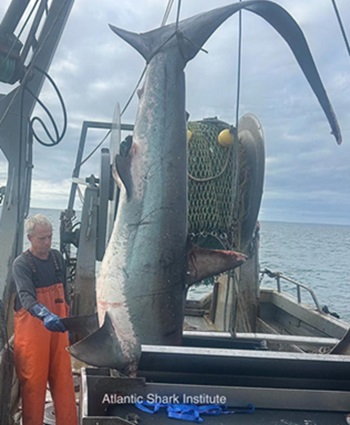 Capt. Chris Brown was off Block Island fishing for scup, a small fish that weighs about a pound, when something much bigger landed on his deck: a 500-pound, 16-foot-long common thresher shark. The big catch might have been a boon for some commercial fishermen. Thresher sharks “are a popular eating fish,” but “like a lot of species, they are declining,” said Jon Dodd, executive director of the Atlantic Shark Institute in Wakefield. Brown is among more than 25 local commercial fishermen and charter boat captains that provide an invaluable service for the Atlantic Shark Institute by tagging sharks, according to Dodd. Dodd also goes on the water and tags sharks, but they’re often not easy to find, and his institute can cast a much wider net with the help of fishermen like Brown, who provide their help for free, Dodd said. more, >>CLICK TO READ<< 08:07
Capt. Chris Brown was off Block Island fishing for scup, a small fish that weighs about a pound, when something much bigger landed on his deck: a 500-pound, 16-foot-long common thresher shark. The big catch might have been a boon for some commercial fishermen. Thresher sharks “are a popular eating fish,” but “like a lot of species, they are declining,” said Jon Dodd, executive director of the Atlantic Shark Institute in Wakefield. Brown is among more than 25 local commercial fishermen and charter boat captains that provide an invaluable service for the Atlantic Shark Institute by tagging sharks, according to Dodd. Dodd also goes on the water and tags sharks, but they’re often not easy to find, and his institute can cast a much wider net with the help of fishermen like Brown, who provide their help for free, Dodd said. more, >>CLICK TO READ<< 08:07
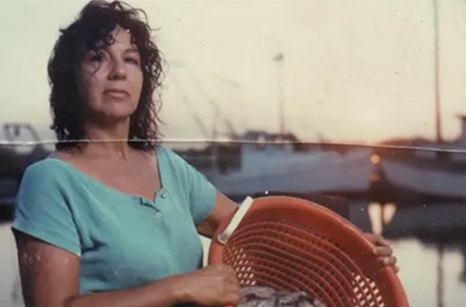
A former shrimper tries to revive Matagorda Bay and its fishing industry with $50 million pollution settlement
Few people still fish for a living on the Gulf Coast of Texas. The work is hard and pay is meager. In the hearts of rundown seaside towns, dilapidated harbors barely recall the communities that thrived here generations ago. But at the docks of Port Lavaca, one group of humble fishermen just got a staggering $20 million to bring back their timeless way of life. They’re buying out the buyer of their catch, starting the largest oyster farm in Texas and dreaming big for the first time in a long time. “We have a lot of hope,” said Jose Lozano, 46, who docks his oyster boats in Port Lavaca. “Things will get better.” It’s all thanks to one elder fisherwoman’s longshot crusade against the petrochemical behemoth across the bay, and her historic settlement in 2019. Diane Wilson, a fourth-generation shrimper from the tiny town of Seadrift, took on a $250 billion Taiwanese chemical company, Formosa Plastics Corp., and won a $50 million trust fund, the largest sum ever awarded in a civil suit under the Clean Water Act. Photos, more, >>CLICK TO READ<< 06:47
Worcester hiring PR firm to fight offshore wind
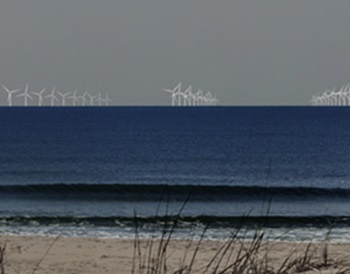 Sometimes, even David needs a public relations firm in his corner to take on Goliath. In the face of what they described as an apathetic response to Worcester County’s offshore wind concerns, the county’s Board of Commissioners on Dec. 17 voted unanimously to contract with Bedrock Advocacy Communications, a public relations firm based in Virginia. The agency will help with grassroots mobilization, strategic communications, and online engagement for a 2025 campaign to oppose ongoing wind farm development off the Atlantic Coast, according to Worcester County Chief Administrative Officer Weston Young. Young said when it comes to protesting the planned 114-turbine wind farm by developer US Wind, there have been a lot of grassroots efforts, but none that were coordinated. He said Bedrock will serve as the campaign developer and manager, working collaboratively with representatives from Worcester County, Ocean City, and the local business community. more, >>CLICK TO READ<< 16:53
Sometimes, even David needs a public relations firm in his corner to take on Goliath. In the face of what they described as an apathetic response to Worcester County’s offshore wind concerns, the county’s Board of Commissioners on Dec. 17 voted unanimously to contract with Bedrock Advocacy Communications, a public relations firm based in Virginia. The agency will help with grassroots mobilization, strategic communications, and online engagement for a 2025 campaign to oppose ongoing wind farm development off the Atlantic Coast, according to Worcester County Chief Administrative Officer Weston Young. Young said when it comes to protesting the planned 114-turbine wind farm by developer US Wind, there have been a lot of grassroots efforts, but none that were coordinated. He said Bedrock will serve as the campaign developer and manager, working collaboratively with representatives from Worcester County, Ocean City, and the local business community. more, >>CLICK TO READ<< 16:53
Fishermen report slow mullet season
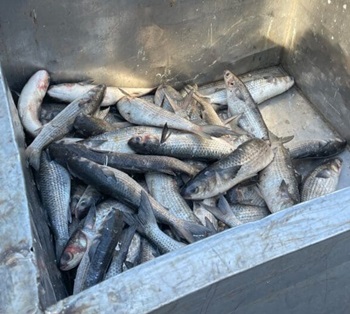 With peak mullet season winding down, local fishermen hoping to cash in by selling their catches at the fish houses are reporting a lesser harvest than in recent years. “We’ve had one good day in the last two weeks,” said one fisherman, who asked not to be identified. “I don’t know what it is that’s killing the seagrass, but the three of us have been everywhere and the fish just aren’t there.” According to the University of Florida IFAS website, “Mullet can tolerate a wide range of salinities and can be found in fresh or saltwater. Their diet consists of bacteria and single-celled algae found attached to plants. They pick at the bottom, and scrape seagrasses consuming these. Sarasota Bay Estuary Program Executive Director Dave Tomasko weighed in on possible factors that could account for a slow fishing season. more, >>CLICK TO READ<< 09:02
With peak mullet season winding down, local fishermen hoping to cash in by selling their catches at the fish houses are reporting a lesser harvest than in recent years. “We’ve had one good day in the last two weeks,” said one fisherman, who asked not to be identified. “I don’t know what it is that’s killing the seagrass, but the three of us have been everywhere and the fish just aren’t there.” According to the University of Florida IFAS website, “Mullet can tolerate a wide range of salinities and can be found in fresh or saltwater. Their diet consists of bacteria and single-celled algae found attached to plants. They pick at the bottom, and scrape seagrasses consuming these. Sarasota Bay Estuary Program Executive Director Dave Tomasko weighed in on possible factors that could account for a slow fishing season. more, >>CLICK TO READ<< 09:02
Being squeezed out? Fishermen fear for livelihoods as offshore wind farms pose ‘greatest change’
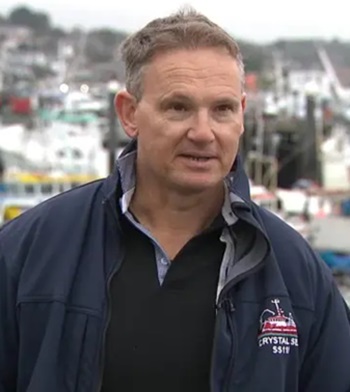 Fishermen in Cornwall fear proposals for mass offshore wind farms could destroy their businesses and pose the “greatest change” the fishing industry has ever faced. The Crown Estate – which owns much of the country’s seabed – has published plans for what it calls “areas of opportunity” for offshore wind farms in waters off the North East and the Celtic Sea around South Wales, Devon and Cornwall. It insists a maximum of 15% of North East and 12% of Celtic Sea zones may be leased to offshore wind companies. He said: “This is probably the greatest change to our fishing patterns and businesses we’re ever going to encounter, we’re going to be squeezed out of the way, that’s our greatest fear, by all these wind farms all of a sudden taking up ground that we traditionally fish.” more, >>CLICK TO READ<< 10:24
Fishermen in Cornwall fear proposals for mass offshore wind farms could destroy their businesses and pose the “greatest change” the fishing industry has ever faced. The Crown Estate – which owns much of the country’s seabed – has published plans for what it calls “areas of opportunity” for offshore wind farms in waters off the North East and the Celtic Sea around South Wales, Devon and Cornwall. It insists a maximum of 15% of North East and 12% of Celtic Sea zones may be leased to offshore wind companies. He said: “This is probably the greatest change to our fishing patterns and businesses we’re ever going to encounter, we’re going to be squeezed out of the way, that’s our greatest fear, by all these wind farms all of a sudden taking up ground that we traditionally fish.” more, >>CLICK TO READ<< 10:24
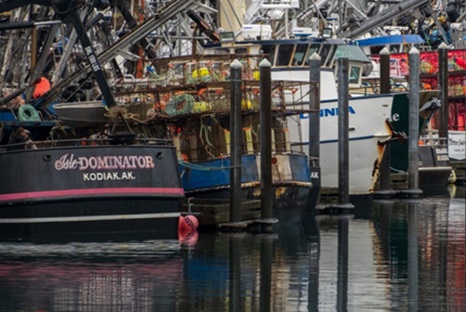
Alaska: Sen. Stevens says more details forthcoming on state insurance pool for commercial fishermen
One of the ideas rising to the top of the Alaska Seafood Task Force’s forthcoming recommendations is an insurance pool for commercial fishermen. The state legislative task force plans to release a full list of a dozen potential bills next month to address a downturn in the seafood market. But the group’s chairperson shared some information in advance with the Kodiak Fisheries Work Group on Dec. 18. State Senator Gary Stevens of Kodiak told members of the Kodiak Island Borough Assembly and City Council that he would like to use a model the Alaska Municipal League is using for sharing its communities’ insurance costs. This is known as the Alaska Municipal League Joint Insurance Association (AMLJIA), which is a self-insurance pool owned and paid for by the municipalities and school districts that make up its membership. more, >>CLICK TO READ<< 08:53
‘Hollow words won’t protect Scottish fishing, industry chief warns
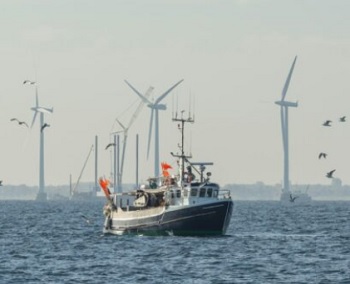 Offshore wind farms in the North Sea and the prime minister’s ambitions to “reset” relations between the UK and European Union are major dangers for the sector, they say. And they want politicians in Edinburgh, London and further afield to “radically rethink” their approach to the sector. Scottish Fishermen’s Federation (SFF) chief executive Elspeth Macdonald outlined these concerns in her new year message to ministers and civil servants “across the UK and beyond”. She said a widespread sense of crisis had spawned a bout of “initiative-itis” by the Scottish and UK governments. more, >>CLICK TO READ<< 09:49
Offshore wind farms in the North Sea and the prime minister’s ambitions to “reset” relations between the UK and European Union are major dangers for the sector, they say. And they want politicians in Edinburgh, London and further afield to “radically rethink” their approach to the sector. Scottish Fishermen’s Federation (SFF) chief executive Elspeth Macdonald outlined these concerns in her new year message to ministers and civil servants “across the UK and beyond”. She said a widespread sense of crisis had spawned a bout of “initiative-itis” by the Scottish and UK governments. more, >>CLICK TO READ<< 09:49
John DeMont: The magic of Christmas is the people who make it happen
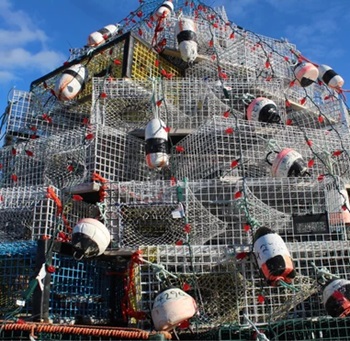 I agree wholeheartedly with the notion that there is something magical about Christmas. The magic, in part, is that it somehow happens every year in our house with no discernible help from me. I say this with shame, not pride. Yet, in some ways, it is for the best. The gift giving — which requires a razor’s edge balance of taste, pragmatism and good will — falls, for good reason, as lightly as a snowflake upon my shoulders. At this point, a thought often occurs to me similar to the one passing through my mind when I head downstairs on Christmas morning: that for this magic to occur, extraordinary people must do remarkable things. In the case of the fisher folk, they must rise in the dark and don layers of clothes. They must drive to a wharf, then they must steam kilometres out on the wild Atlantic Ocean, where they then will hoist up traps from the depths. more, >>CLICK TO READ<< 08:22
I agree wholeheartedly with the notion that there is something magical about Christmas. The magic, in part, is that it somehow happens every year in our house with no discernible help from me. I say this with shame, not pride. Yet, in some ways, it is for the best. The gift giving — which requires a razor’s edge balance of taste, pragmatism and good will — falls, for good reason, as lightly as a snowflake upon my shoulders. At this point, a thought often occurs to me similar to the one passing through my mind when I head downstairs on Christmas morning: that for this magic to occur, extraordinary people must do remarkable things. In the case of the fisher folk, they must rise in the dark and don layers of clothes. They must drive to a wharf, then they must steam kilometres out on the wild Atlantic Ocean, where they then will hoist up traps from the depths. more, >>CLICK TO READ<< 08:22
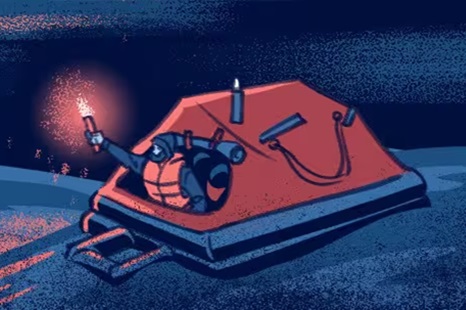
Lost at Sea
When a group of seven fishermen went missing off the northeast coast of Newfoundland in July, the small community of New-Wes-Valley was gripped with dread. Coast Guard captain Colin Roul describes the waters around Newfoundland and Labrador as dangerous and unforgiving. “Usually, when you hear distress situations like this, where no sign or sound was heard from these guys, yeah, the outcome is bleak,” he said. As 24 hours turned to 36, then 48, not much hope remained. “We knew this was going to be a regional funeral,” said Michael Tiller, mayor of New-Wes-Valley, where five of the seven men were from. “The food was ready. The place was booked. We were ready to help this town go through one of the worst disasters that it could ever go through. “But then, news of the nearly impossible — the men were found in a raft about 270 kilometres from shore. Photos, more, >>CLICK TO READ<< 07:43
F/V Elite Navigator, 10 posts, >>CLICK TO READ<<
‘We Need Our Docks!’: Shrimpers’ plea as county reconsiders lease
 The Trico shrimp docks on San Carlos Island remain abandoned, damaged, and tangled in a growing dispute over their future. These docks once served as a vital unloading point for pink Gulf shrimp, supporting the livelihoods of hundreds of people in Fort Myers Beach. Now, the area’s shrimping industry faces an uncertain path forward. “Well, we don’t have any place to dock or unload right now,” said Dennis Henderson, President of Trico Shrimp Company, recalling a time when the docks bustled with activity. Without access to these docks, however, the entire industry could shrink drastically. Video, photos, more, >>CLICK TO READ<< 14:41
The Trico shrimp docks on San Carlos Island remain abandoned, damaged, and tangled in a growing dispute over their future. These docks once served as a vital unloading point for pink Gulf shrimp, supporting the livelihoods of hundreds of people in Fort Myers Beach. Now, the area’s shrimping industry faces an uncertain path forward. “Well, we don’t have any place to dock or unload right now,” said Dennis Henderson, President of Trico Shrimp Company, recalling a time when the docks bustled with activity. Without access to these docks, however, the entire industry could shrink drastically. Video, photos, more, >>CLICK TO READ<< 14:41
‘Tariffs not enough’ to save U.S. shrimping industry
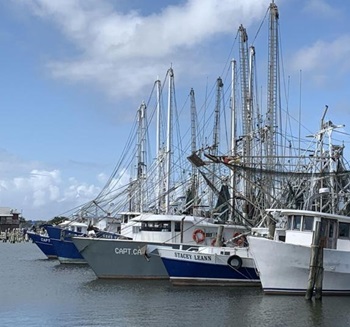 Alan Gibson, president of Tideland Seafood, summed up the frustration at a recent Louisiana Shrimp Task Force hearing in Houma. “Tariffs aren’t enough,” Gibson said. “The decrease in import prices is because of oversupply. They’re competing against each other to sell market share, and we’re fighting them, who are fighting each other.” Gibson called for a 25% import quota, saying it could reduce foreign competition enough to restore balance to the market. David Chauvin, a Louisiana-based seafood company owner, highlighted the disparity. Unlike tariffs, quotas directly limit the volume of imports, addressing the core issue of oversupply. By restricting imports, a quota could help stabilize domestic shrimp prices, allowing U.S. producers to compete more effectively. more, >>CLICK TO READ<< 16:58
Alan Gibson, president of Tideland Seafood, summed up the frustration at a recent Louisiana Shrimp Task Force hearing in Houma. “Tariffs aren’t enough,” Gibson said. “The decrease in import prices is because of oversupply. They’re competing against each other to sell market share, and we’re fighting them, who are fighting each other.” Gibson called for a 25% import quota, saying it could reduce foreign competition enough to restore balance to the market. David Chauvin, a Louisiana-based seafood company owner, highlighted the disparity. Unlike tariffs, quotas directly limit the volume of imports, addressing the core issue of oversupply. By restricting imports, a quota could help stabilize domestic shrimp prices, allowing U.S. producers to compete more effectively. more, >>CLICK TO READ<< 16:58
Worcester launches plan to buy Ocean City fishing harbor seafood businesses, block US Wind
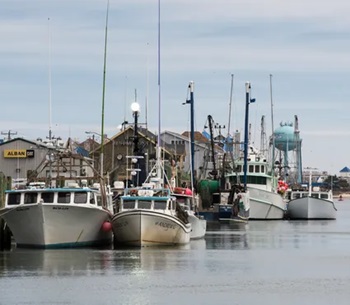 The Worcester County Commissioners on Tuesday launched what they’re hailing as “efforts to purchase two properties located in the West Ocean City (WOC) commercial maritime harbor to protect the county’s historic commercial and sport fishing industries.” Here’s what to know. These sites, which Commissioners said house the only two commercial seafood wholesalers where watermen can offload and sell their catches, are the Southern Connection Seafood and the Martin Fish Company properties. Plans for the two properties include developing a long-term lease with the existing owners to allow them to continue serving the needs of the commercial fishing industry, according to a commissioner’s release. more, >>CLICK TO READ<< 07:28
The Worcester County Commissioners on Tuesday launched what they’re hailing as “efforts to purchase two properties located in the West Ocean City (WOC) commercial maritime harbor to protect the county’s historic commercial and sport fishing industries.” Here’s what to know. These sites, which Commissioners said house the only two commercial seafood wholesalers where watermen can offload and sell their catches, are the Southern Connection Seafood and the Martin Fish Company properties. Plans for the two properties include developing a long-term lease with the existing owners to allow them to continue serving the needs of the commercial fishing industry, according to a commissioner’s release. more, >>CLICK TO READ<< 07:28

New England scallopers face a tough 2025
New England scallopers are looking at another tough year in 2025, as they prepare for a set of federal regulations to protect both their livelihoods and the Atlantic Ocean’s scallop populations. If approved by NOAA Fisheries, the new rules, called Scallop Framework 39, will reduce the number of times that full-time vessels can go drag in some federally-managed scalloping grounds — called “access areas” — in the 2025 fishing year. But they will allow these vessels more time to scallop in the open ocean. The start of the access-area scalloping season will also be pushed back from April 1 to May 15, 2025. It will end on March 31, 2026. Local scallopers and industry representatives say the contents of Framework 39 are not a surprise. Landings have been shrinking over the past four years. “We’re just tightening the belt, and taking a deep breath, and riding the storm out,” said New Bedford scallop vessel manager and owner Tony Alvernaz. more, >>CLICK TO READ<< 17:50
50 years plus: Zephyr PL 6
 Janbill was built at Miller’s yard in Sto Monans as a copy of the 56ft Jeniska, although she was two frames shorter, at about 51ft. She was built alongside True Vine KY 7, which had an almost identical hull – although Janbill had a forward wheelhouse for stern trawling and True Vine didn’t. Both were launched on the same day – 29 March, 1974. Janbill was built for Eyemouth skipper Willie Dickson, the name coming from his and his wife’s names. She was fitted with a Mastra winch, a Carron power block and a Volvo Penta 290hp engine. She started work fishing the North Sea for whitefish, registered as LH 103. Photos, more, >>CLICK TO READ<< 07:55
Janbill was built at Miller’s yard in Sto Monans as a copy of the 56ft Jeniska, although she was two frames shorter, at about 51ft. She was built alongside True Vine KY 7, which had an almost identical hull – although Janbill had a forward wheelhouse for stern trawling and True Vine didn’t. Both were launched on the same day – 29 March, 1974. Janbill was built for Eyemouth skipper Willie Dickson, the name coming from his and his wife’s names. She was fitted with a Mastra winch, a Carron power block and a Volvo Penta 290hp engine. She started work fishing the North Sea for whitefish, registered as LH 103. Photos, more, >>CLICK TO READ<< 07:55
All crew members rescued after 65-foot fishing vessel capsized just off Ventura Harbor entrance
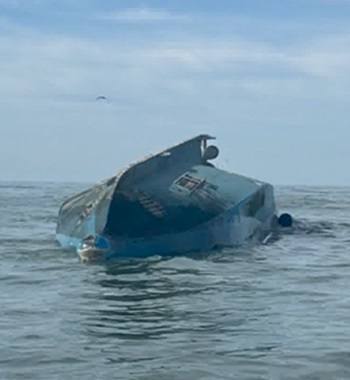 Four crew members were rescued after their 65-foot commercial fishing vessel capsized just outside of the Ventura Harbor entrance Friday. Two of those crew members were transported to a local hospital for further medical evaluation shared the Ventura Harbor Patrol. At 9:59 a.m., the Ventura Harbor Patrol and U.S. Coast Guard received a report of the capsized F/V Net Effect, a 65-foot fishing vessel, just outside of the Harbor’s entrance stated a request for information from the Ventura Harbor Patrol. According to Ventura Harbor Patrol, the capsized vessel is outside the jurisdiction of the Harbor and Port District boundaries and the U.S. Coast Guard is coordinating the handling of removing fuel from the vessel. Video, Photos, more, >>CLICK TO READ<< 13: 47
Four crew members were rescued after their 65-foot commercial fishing vessel capsized just outside of the Ventura Harbor entrance Friday. Two of those crew members were transported to a local hospital for further medical evaluation shared the Ventura Harbor Patrol. At 9:59 a.m., the Ventura Harbor Patrol and U.S. Coast Guard received a report of the capsized F/V Net Effect, a 65-foot fishing vessel, just outside of the Harbor’s entrance stated a request for information from the Ventura Harbor Patrol. According to Ventura Harbor Patrol, the capsized vessel is outside the jurisdiction of the Harbor and Port District boundaries and the U.S. Coast Guard is coordinating the handling of removing fuel from the vessel. Video, Photos, more, >>CLICK TO READ<< 13: 47






 The family of two fishermen who went missing off the coast of Downeast Maine a week ago is hoping divers will recover the bodies of Chester Barrett and his son, Aaron Barrett, Saturday. On Wednesday night, officials located the Barretts’ fishing vessel, “Sudden Impact,” submerged in 160 feet of water near Moose Cove, between Cutler and Lubec. Commercial divers, Maine Marine Patrol officers, and volunteer fishermen were in the area Saturday afternoon to assist in the recovery efforts, according to the family.
The family of two fishermen who went missing off the coast of Downeast Maine a week ago is hoping divers will recover the bodies of Chester Barrett and his son, Aaron Barrett, Saturday. On Wednesday night, officials located the Barretts’ fishing vessel, “Sudden Impact,” submerged in 160 feet of water near Moose Cove, between Cutler and Lubec. Commercial divers, Maine Marine Patrol officers, and volunteer fishermen were in the area Saturday afternoon to assist in the recovery efforts, according to the family.  South Addison – At approximately 11 p.m. Wednesday, the State Police/Marine Patrol Underwater Recovery Dive Team, assisted by local fishermen, took advantage of “slack water” and utilized a remotely operated underwater vehicle (ROV) equipped with sonar and a camera to confirm the identity of the sunken fishing vessel “Sudden Impact.” The vessel is located in 160 feet of water near Moose Cove in eastern Washington County between the towns for Cutler and Lubec in an area of strong tidal current activity. Using the ROV, crews were able to observe what is believed to be the body of an individual on board the vessel. Recovery was not possible as of last night. Chester Barrett and his son Aaron, fishermen from South Addison, have been missing since Saturday evening when the two failed to return as expected after transiting on board the “Sudden Impact” from Edmunds to South Addison. The Maine Marine Patrol will continue to work with family members of the Barretts to determine next steps, including consultation with deep water salvage and recovery experts to determine whether a recovery effort is feasible.
South Addison – At approximately 11 p.m. Wednesday, the State Police/Marine Patrol Underwater Recovery Dive Team, assisted by local fishermen, took advantage of “slack water” and utilized a remotely operated underwater vehicle (ROV) equipped with sonar and a camera to confirm the identity of the sunken fishing vessel “Sudden Impact.” The vessel is located in 160 feet of water near Moose Cove in eastern Washington County between the towns for Cutler and Lubec in an area of strong tidal current activity. Using the ROV, crews were able to observe what is believed to be the body of an individual on board the vessel. Recovery was not possible as of last night. Chester Barrett and his son Aaron, fishermen from South Addison, have been missing since Saturday evening when the two failed to return as expected after transiting on board the “Sudden Impact” from Edmunds to South Addison. The Maine Marine Patrol will continue to work with family members of the Barretts to determine next steps, including consultation with deep water salvage and recovery experts to determine whether a recovery effort is feasible.  The U.S. Coast Guard has officially suspended the search for two commercial fishermen who were reported missing after they did not return to port on Saturday night. Chester Barret and his son Aaron Barrett were on board their fishing vessel F/V Sudden Impact. They planned to travel from Edmunds to South Addition. The 34-foot scallop vessel left Cobscook Bay State Park around 5 a.m. Saturday. After encountering rough conditions, they planned to seek refuge in Cutler but became unreachable, according to authorities. On Sunday night at 6 p.m. the search was called off. The Coast Guard said they searched for more than 42 hours combined and 950 square miles of ocean and coastline with the help of Marine Patrol and other agencies.
The U.S. Coast Guard has officially suspended the search for two commercial fishermen who were reported missing after they did not return to port on Saturday night. Chester Barret and his son Aaron Barrett were on board their fishing vessel F/V Sudden Impact. They planned to travel from Edmunds to South Addition. The 34-foot scallop vessel left Cobscook Bay State Park around 5 a.m. Saturday. After encountering rough conditions, they planned to seek refuge in Cutler but became unreachable, according to authorities. On Sunday night at 6 p.m. the search was called off. The Coast Guard said they searched for more than 42 hours combined and 950 square miles of ocean and coastline with the help of Marine Patrol and other agencies. 